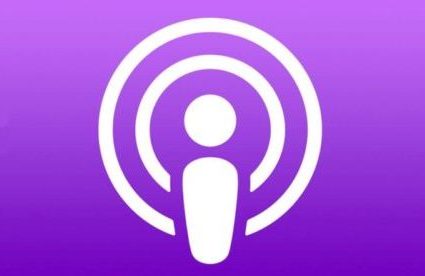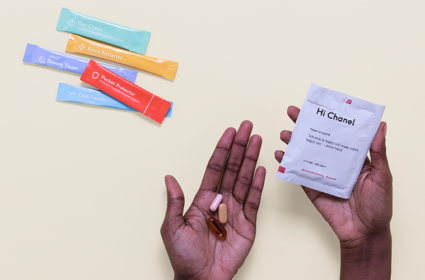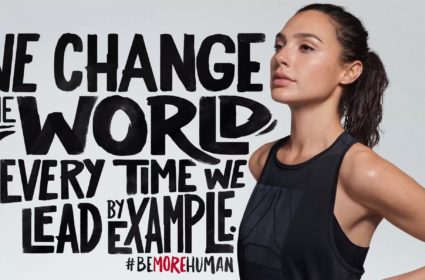Cognitive bias and consumer research… what we’ve been reading this week at Brand Genetics

We’ve been reading all about cognitive biases and a few revealing insights have caught
our eye…
What are cognitive biases?
To help deal with the complexity around us, our brains often use mental shortcuts — called ‘heuristics’ — during problem solving to simplify judgement and decision- making processes. However, sometimes these mental shortcuts can lead us astray, causing us to make judgments or decisions that are inaccurate, illogical or ‘irrational.’ These ‘deviations’ are known as cognitive biases. While we cannot completely avoid or eliminate cognitive biases, it is important to understand how and why they arise so as to limit their impact on our lives and our work.
As innovation consultants and researchers, we feel it’s particularly important to understand the relevance of cognitive biases in qualitative research — so we can design and shape our methodologies to limit their influence. This week we wanted to explore three cognitive biases we feel are particularly relevant to the world of consumer research, and how we share, process, and present information: The Empathy Gap, Anchoring and Confirmation bias.
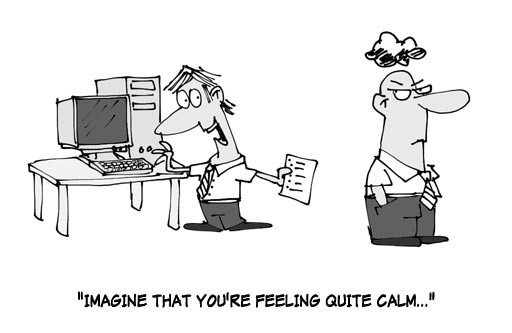
The Empathy Gap
The empathy gap, or the hot-to-cold empathy gap, occurs when people underestimate the influence of their emotional states (such as anger or anxiety) on their behaviour or preferences and overestimate the intellectual influence on their decision-making. We often assume our rational self is making all of our decisions, when it is usually our emotional state guiding us. Since emotions are embedded deep in our psychology, they have more salience in our mind and therefore often drive decisions involuntarily. Human understanding is state dependent which means it is difficult to understand what it is like to be calm, when you are angry.
Research implications — Being mindful of one’s own emotional state is key for qualitative research, particularly for ethnography and focus groups. Having awareness of your own emotional states and checking in with your emotions before you begin a group or an interview enables you to better put yourself in the shoes of others, closing the empathy gap and making sure your own emotional state does not bias your research findings.
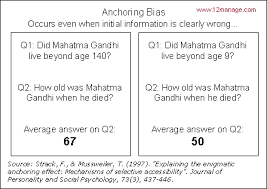
Anchoring
Anchoring is a well-known but very important cognitive bias, defined as the tendency to place too much importance on the initial pieces of information presented when making decisions. All subsequent judgements and decisions are then based off this initial piece of information. This is clearly demonstrated when respondents are asked to quantify something, as seen in the Mahatma Gandhi example above where the information presented in question one anchors the answers to question two. On the left, respondents are initially presented with an older age which influenced their answer to question two. The same thing happened on the right, where respondents are given a younger age in question one and responded respectively with a lower age.
Research implications — Anchoring has a huge impact when guiding discussions and interviews as well as when designing qualitative surveys. It is important to be aware of the first pieces of information you give to consumers as this will influence all the answers thereafter.

Confirmation bias
Confirmation bias is the tendency to search for, interpret, focus on and remember information that confirms and/or reflects our own preconceptions. When collecting data, people (subconsciously) choose selectively, seeking out information which agrees with their existing belief systems. Following this, people tend to interpret ambiguous evidence as supporting their current position. Confirmation bias contributes to overconfidence in pre-existing beliefs which can result in poor decision making.
We see this happening frequently in the current fractious political climate, where, aided by the social media echo-chamber, an individual’s perception of the world can be continuously reinforced and consequently all activities are viewed through a very specific (and occasionally poisonous) prism.
Research implications — Since we tend to be drawn to details that confirm our own existing beliefs, confirmation bias has a huge impact on what and how people gather data. It is important for researchers to give as much attention as possible to beliefs that contradict and challenge those that are held most strongly. One way of doing this is to explore the reasons why people reject a certain behaviour or product in order to present a more balanced argument. Similarly, when discussing research findings, it can be informative to charge one person with taking the opposite point of the view to the group collective, thus ensuring that the group bias is also thoroughly challenged.
The Human Experience (HX) learnings? When thinking about ourselves and our work, it is important to remember that we are all human, and humans are fallible. Therefore we must make an effort to acknowledge and address our cognitive biases, particularly in relation to qualitative research processes.
When addressing the Empathy Gap, Anchoring, and Confirmation Bias, it’s important to:
- Be aware of our and consumers’ emotional states when conducting research in focus groups or ethnographies
- Consider the order in which we present information when guiding discussions or writing surveys
- Purposefully seek out information that challenges or contracts our viewpoints, to avoid overconfidence

